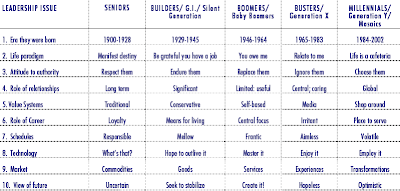The Y Generation may seem allusive in your attempts to reach them with your product or service. The Y Generation or also known as Gen Y or the Millennials, were born between 1984 and 2002. They like choices and to be able to customize their decisions. They don’t want someone else to make the choices for them. Pro-democracy movements around the world are now being driving by Gen Y who are using technology very effectively. As we think about marketing to this generation, they have been conditioned to options which they can customize for themselves. They also want to follow a leader, but that leader needs to be credible and worthy of their following (and they might do it primarily using technology). This generation is looking for role models because the lack credible figures of authority. Here are the most recent generations and their populations numbers:
Seniors: 1900-1928 56 million
Builders: 1929-1945 59 million
Boomers: 1946-1964 76 million
Busters or Gen X: 1965-1983 44 million
Millennials or Gen Y: 1984-2002 78 million
 |
| courtesy of Crown Financial Ministries www.crown.org |
Millennials or GenY are over-exposed to information but lacking in real world experience. A real world experience allows a person to accept responsibility, grow and mature. Gen Y’s like to live in their comfortable “home bubble”. This can cause societal stresses. Just ask the people of Italy. For years they have been dealing with a generation that doesn’t want to leave home, primarily men.
Even within the Y Generation, there are shifts or changes, but technology is making those shifts occur more frequently. They have access to a lot of information through which they view their world. They can be self-centered people. After all, they are encouraged to market themselves on the web. Their focus becomes their web identity. New technology shapes the world of Gen Y. The developing nations that have access to technology are also composed of a large Gen Y population with similar characteristics. Within the Gen Y group, there is a shift from those born in the early years to those in the latter. The shift within the Gen Y is as follows:
From high compassion to low empathy.
From activists to “slackivists”.
Technology is an appendage, not a tool.
From civic-minded to self-absorbed.
Ambitious about the future turned to ambiguity.
From accelerated growth to postponed maturation.
The Gen Y generation has a very short attention span and find it just as difficult to make a commitment as the Gen Xers. Gen Y’s take more time to get ready in the morning than any previous generation. They communicate and live in their little bubbles. Gen Y’s have multiple visions and lack a clear calling in their lives. They are staying in adolescence longer. It is comfortable, easy, few responsibilities, plenty of money, and life is fun and that’s the meaning of life. If it’s not fun, it’s not worth pursuing. The new 18 is now 26. Adolescence for Gen Y now doesn’t end until they reach 30 years. Over the next two decades, millions of baby boomers and Gen X will be retiring and the Gen Y is not ready to step into leadership positions.
Listed are 5 characteristics of Gen Y.
1. Mischievous.
2. Want their mother near-by.
3. Don’t want to grow up.
4. Frugal and afraid of debt.
5. Can’t function without being connected to technology.
7 Reasons why Gen Y’s don’t mature quickly.
1. School culture – relating to too many peers. Social silos.
2. Niche marketing – keep them young and consuming.
3. Prescription drugs – we are medicating our children resulting in personality alteration.
4. Parenting styles – hovering tactics. Protecting vs. training.
5. Endocrine disruptors – chemicals in our environment and food that alters physical bodies.
6. Video games – disables Millennials from engaging with humans.
7. Media and technology – makes people lazy and self centered. It’s all about “me”.
Generation Y wants to tell their story. The more of the following elements you implement, the more success you will have in connecting with Gen Y.
Top 5 Challenges facing Gen Y.
1. They have to live in a world that the older generation created.
2. Too much dependency upon technology.
3. Information over-load leading to decision making paralysis.
4. Insecurity and low self-esteem.
5. Peer influences steer their decision making.
Top 10 Tips for Marketing to the Gen Y Generation.
1. Offer them a variety of products or services.
2. Engage them with images.
3. Allow them to tailor their desires.
4. Appeal to their need for recognition.
5. Provide immediate information and feedback.
6. Help them to simplify their lives .
7. Ask them for their opinions on how to improve something.
8. Pursue them and speak their language.
9. Reach them through entertaining media.
10. Appeal to their insecurities.
The next article will cover tips on how to lead the Gen Y.
No comments:
Post a Comment